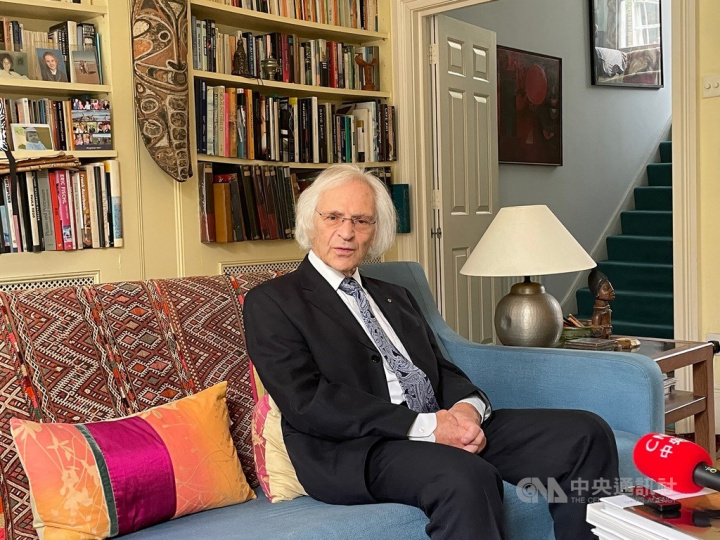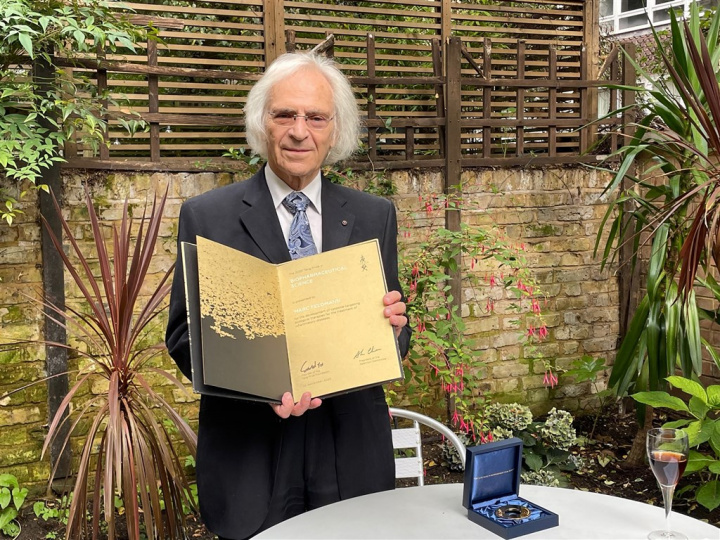

London, Nov. 24 (CNA) Immunologist and Tang Prize laureate Marc Feldmann has seen his pioneering treatment used to tackle over a dozen diseases, revolutionizing the pharmaceutical industry while helping treat millions of patients. But at 76 years old, he shows no signs of slowing down.
In a recent interview with CNA, the retired Oxford professor reflected on his research path and his numerous ongoing projects, crediting his seemingly inexhaustible energy to a drive to help people and do good.
After already changing the world once, he said the temptation to keep going "is very strong." And he is optimistic that he just might be able to do it again.
From laboratory findings to a powerful therapy
Feldmann, who grew up in France and Australia but spent most of his research career in the United Kingdom, is one of three recipients of the 2020 Tang Prize in Biopharmaceutical Science, and was officially awarded the prize at a virtual ceremony last week.
The immunologist is credited with being the first to demonstrate that patients with rheumatoid arthritis, a disease that causes pain and swelling in one's joints, had far more pro-inflammatory cytokines than normal, and identified tumor necrosis factor (TNF) as the key one.
Cytokines are a large family of proteins found in the immune system that play a key role in one's responses to infection; the primary function of TNF in particular is the regulation of immune cells.
After identifying TNF as a target, Feldmann worked with his colleagues to successfully develop an anti-TNF antibody for the treatment of rheumatoid arthritis.
Today, anti-TNF treatments have become "standard therapy" for rheumatoid arthritis as well as multiple autoimmune and inflammatory diseases, converting them from severely debilitating conditions to largely manageable diseases, the Tang Prize Foundation said in its award citation.
Speaking to CNA at his home in London, Feldmann said that he and his collaborators knew very quickly that the treatment they had developed was effective.
Even before getting a full course of treatment, patients in their first trial reported feeling a lot better, "and when the treatment stopped, our second ever patient went back to playing golf," he said.
It was an "unexpected surprise," he said. "You often read that it takes years to find out if your medicine works; we found out that our medicine worked within two hours of starting the project."
The discovery of anti-TNF therapy as an effective treatment not only helped the patients treated by the drug, it also created a lasting impact on the pharmaceutical industry as a whole, Feldmann said.
"The work we did together was the first use of a monoclonal antibody in a common disease for a long period of time," he said. As the number of patients who benefitted from taking these types of drugs increased, and as their use in other diseases also grew, "this changed the pharmaceutical industry forever."
"Now, half of the new medicines are monoclonal antibodies," he said.
New opportunities to change the world
At 76 years of age, "I am not short of ambition, but I am short of time", Feldmann said. In his "so-called retirement" from being a professor, as he puts it, he has set up six companies with his colleagues that focus on creating new medicines for a wide range of diseases.
These include new applications for anti-TNF treatment, use of synthetic cannabinoids, stem cell therapy, and treatments for neurodegenerative diseases and cancer, according to Feldmann.
He is optimistic, he said, that this "new career with friends" will give him an opportunity to "perhaps change the world again for the better."
The value of research
Although his research has been a success, Feldmann initially studied and trained to become a medical doctor, only switching to research after he started practicing.
"Within one year in the hospital, I realized that we did not have very many effective medicines," he said, and "it was clear that the way to develop new treatments was through research."
It was a risky decision. Being a doctor "is a guaranteed way in every culture to make a bit of an average income and living," he said. "Doing research is far from guaranteed."
Still, he decided to take the risk because he knew that if his work was successful, he would be able to treat a large number of patients, which he said has come to pass.
For Feldmann, research has also been a wonderful education in many ways, and it has allowed him to contribute to the vast expanse of human knowledge.
"It's important to realize that the foundation of all new knowledge is research," he said, emphasizing that it is an endeavor that requires many people, each of whom is important to the process in different ways.